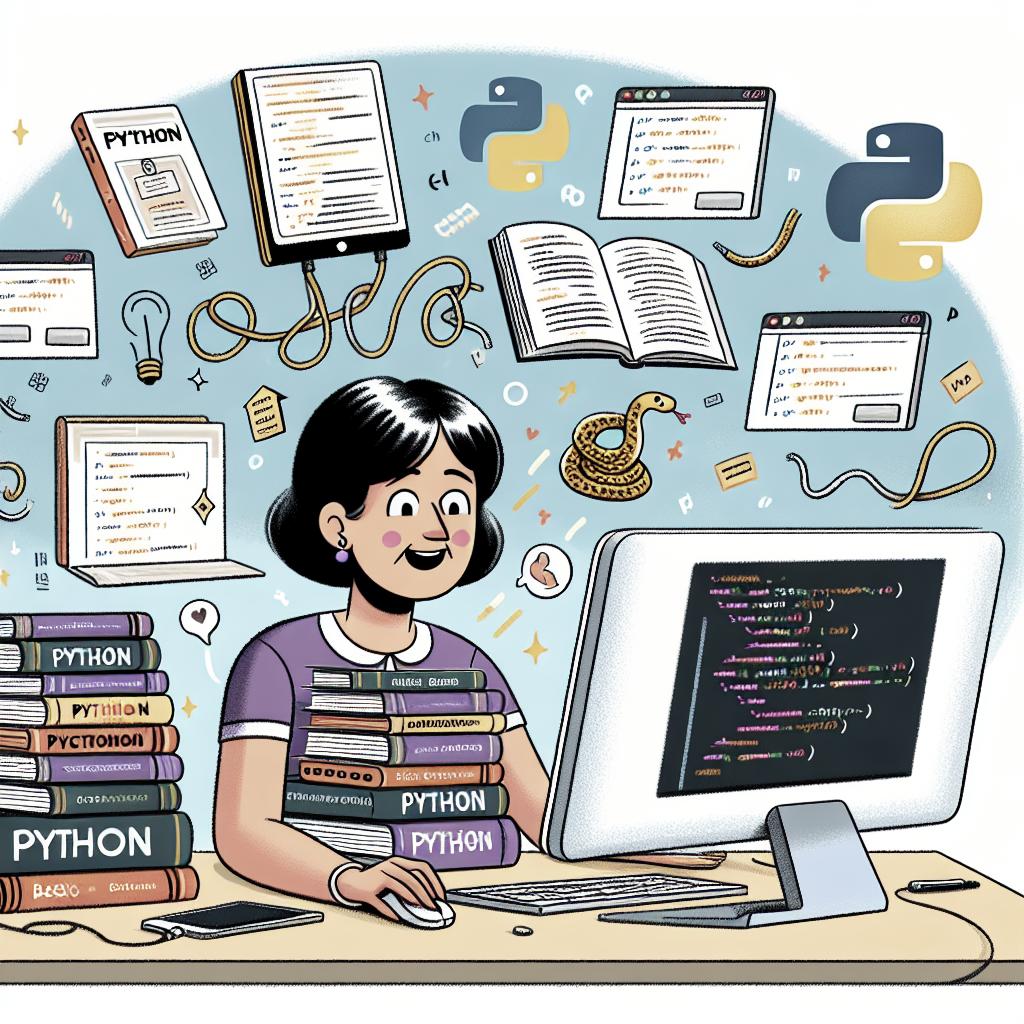“`html
Best Resources to Learn Python: Your Guide to Becoming a Python Pro
Python has become one of the most popular programming languages in the world, thanks to its simplicity and versatility. Whether you’re a beginner looking to embark on a programming journey, or an experienced coder wanting to broaden your skills, mastering Python can open a myriad of opportunities. In this post, we will explore some of the best resources available to learn Python, ranging from official tutorials, interactive courses, fascinating books, engaging YouTube channels, and beyond. Dive into this curated list of resources and discover how each one can help you elevate your understanding of Python, setting you on the path to becoming a proficient developer.
1. Python.org:
Python.org is the official website for Python and a fundamental resource for both new and experienced programmers. The site offers robust documentation, including a getting started guide and detailed explanations of Python’s many features. As the backbone for Python learners, its official documentation is essential for understanding Python’s standard libraries and advanced concepts.
Besides documentation, Python.org provides access to the latest software releases, archives, news, and community links. Developers of all skill levels can rely on it for troubleshooting and connecting with the Python community around the world. Engaging with this detailed and official information is crucial for building a solid foundation in Python programming.
2. Codecademy:
Codecademy is an interactive learning platform that offers a Python course designed to teach you programming fundamentals in an engaging way. The platform allows learners to write actual code within its integrated development environment, emphasizing a code-centric approach which helps solidify programming concepts as you learn.
One of the key benefits of Codecademy is its focus on interactive lessons and projects. It encourages active learning by letting you apply new skills right away, providing immediate feedback to reinforce knowledge. Thus, Codecademy is an excellent choice if you prefer a hands-on learning experience.
3. Coursera:
Coursera offers Python courses from some of the top universities and institutions worldwide, such as the University of Michigan and Google. With various courses ranging from beginner to advanced levels, Coursera provides comprehensive content suitable for learners at different stages in their Python journey.
The platform often includes peer-graded assignments, quizzes, and capstone projects, creating an academic environment that simulates real-world applications of Python. This structured approach ensures that learners gain both theoretical and practical understanding of Python, preparing them for career demands.
4. edX:
Similar to Coursera, edX offers Python courses from esteemed universities, including MIT and Harvard. The platform provides access to high-quality educational content in the form of courses, professional certificates, and even degrees. This variety of offerings means learners can choose and engage with content that best suits their goals and skill levels.
edX’s unique selling point is the ability to audit courses for free, while providing optional certificates for a fee. This flexibility allows learners to sample courses before committing financially, making edX a risk-free option for those cautiously stepping into Python programming.
5. Automate the Boring Stuff with Python:
“Automate the Boring Stuff with Python” by Al Sweigart is a popular tool among beginners looking to apply Python to real-world tasks. The book emphasizes practical applications of Python, showing readers how to automate mundane tasks like organizing files and scraping websites.
The book’s approach is highly project-based, which encourages readers to start coding right away. It’s particularly suitable for those who wish to see immediate practical outputs from their learning efforts, making mundane tasks with computers fluent through automation.
6. Google’s Python Class:
Google offers a free Python course intending to introduce developers to Python’s core concepts. It’s designed as an introduction for those with programming experience in other languages but is also beneficial for beginners due to its resources like lectures, written materials, and practical coding exercises.
The course, being concise and focused, serves as an excellent starting point. As a result, it’s particularly great for self-motivated learners who prefer a snapshot tour through Python enhanced by exercises, without the need for extensive reading or prolonged classroom sessions.
7. Real Python:
Real Python is a platform that offers a wide range of Python tutorials, videos, quizzes, and articles. Authored by Pythonistas from around the globe, Real Python content is always up-to-date, following current trends and tools relevant to Python programming.
It caters to all skill levels, with an emphasis on effective learning paths that guide users through their specific development needs. The combination of textual content and interactive coding practices makes Real Python a comprehensive learning destination.
8. YouTube Channels:
YouTube is a treasure trove of Python learning resources. Channels like Corey Schafer, Traversy Media, and Sentdex offer comprehensive Python tutorials that cater to different learning styles. From basics of Python syntax to complicated data analysis, there is virtually no Python topic that isn’t covered among these channels.
Video learning offers a visually-engaging and oftentimes more intuitive way to grasp complex concepts. By subscribing to valuable Python YouTube channels, learners can complement structured learning with informal, insight-packed video guides. This is an ideal resource for those who find classroom settings intimidating or unengaging.
9. PythonBooks.org:
PythonBooks.org is an extensive directory of Python books available to learners of any level. By categorizing books into themes like data analysis, machine learning, and web development, it provides a clear path for specialized exploration into Python’s capabilities.
The platform also provides user reviews and categories to assist learners in selecting books that match their learning focus. A large inventory of e-books offers a possibility to learn Python offline, providing an opportunity to start learning in-depth concepts conveniently.
10. Full Stack Python:
Full Stack Python is a synthesis of resources designed to help developers understand how to build robust web applications using Python. It tackles every layer of the Python application stack, from deployment to web frameworks, with explanations and tutorials.
Covering concepts such as DevOps, relational databases, and security, the portal is perfect for those interested in Python web development. This resource is perfect for coders looking to understand the complete life cycle of a web application using Python.
11. Python Weekly Newsletter:
The Python Weekly Newsletter is an invaluable resource for developers wanting to keep pace with the ever-evolving Python ecosystem. Every week it rounds up articles, tutorials, and libraries that are making waves in the community.
By subscribing to Python Weekly, enthusiasts and professionals alike can stay informed about the latest trends, projects, and advancements in Python, fostering a continuous learning environment. It’s an ideal resource for staying updated and uncovering new resources and tools.
12. Python Podcasts:
Podcasts such as “Talk Python To Me,” and “Python Bytes,” are wonderful companions on your Python learning journey. They offer interviews with experts, discussions on the latest advancements, and insider tips that can benefit both new learners and seasoned programmers.
As auditory learning can complement visual or textual methods, podcasts are a convenient choice for learning Python on the go, whether you’re commuting, exercising, or relaxing. Podcasts provide an innovative, storytelling angle on the world of Python.
13. Python Subreddits and Forums:
Subreddits like r/Python and forums such as Python Forum provide a space for professionals and hobbyists alike to seek advice, share code, and discuss topics related to Python programming. These platforms are a goldmine of user-driven problem-solving and ideas.
Choosing active platforms can enhance your learning through real-world examples and community support, creating opportunities for feedback and collaboration. Interacting with fellow learners and professionals can help refine your understanding and introduce diverse coding techniques.
14. SoloLearn:
SoloLearn provides an interactive and social experience for learning Python, offering free courses that emphasize coding exercises and challenges. Its mobile-friendly platform means you can practice and learn on-the-go with ease.
The community aspect adds a layer of social learning, allowing learners to engage in discussions, solve problems collaboratively, and share achievements. SoloLearn is ideal for mobile-first learners seeking to blend progress with friendly competition.
Practice, Practice and Practice
The essence of mastering Python, or any programming language, hinges on consistent practice. Through lots of coding exercises, projects, and real-world applications, your proficiency will grow. Working on personal projects or contributing to open-source projects can significantly boost your Python skills.
Regular practice not only solidifies your understanding but also builds the confidence to tackle increasingly complex problems. Make use of online platforms, challenges, and repositories to put your skills to the test and collaborate with others globally.
Lessons Learned
| Resource | Description |
|---|---|
| Python.org | Official Python documentation and community hub. |
| Codecademy | Interactive, hands-on Python course platform. |
| Coursera | Access to Python courses from top universities and organizations. |
| edX | University-based, free-to-audit, Python courses. |
| Automate the Boring Stuff with Python | Book focusing on automating practical tasks using Python. |
| Google’s Python Class | Free course designed for those with or without prior experience. |
| Real Python | Comprehensive, updated tutorials and learning paths. |
| YouTube Channels | Visually-engaging tutorials for different learning preferences. |
| PythonBooks.org | Curated list of Python books for various interests and levels. |
| Full Stack Python | A resource for learning to build web applications with Python. |
| Python Weekly Newsletter | Weekly updates on trends, tutorials, and libraries in Python. |
| Python Podcasts | Auditory resource with discussions and insights into Python. |
| Python Subreddits and Forums | Community-driven discussion and insight platforms. |
| SoloLearn | Mobile-friendly, interactive platform for learning Python. |
“`


